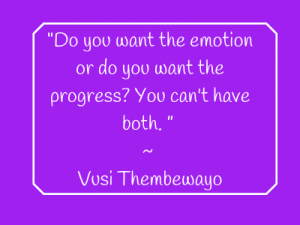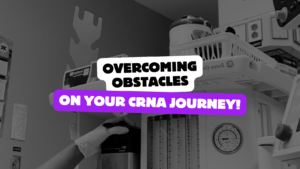“I don’t want to be at the mercy of my emotions. I want to use them, to enjoy them, and to dominate them.” ~ Oscar Wilde
We can all agree as critical care nurses, we deal with some pretty heavy and emotional stuff. And then we go home and deal with even more stuff. When I think about it, I’m not sure exactly how we function as well as we appear to.
The ability to experience your emotions and then express them in a positive way is very important to your well being, success as a healthcare provider and progress towards becoming a CRNA. Also being in control of your emotions allows you to think critically, build relationships, and interact with others in other healthcare professionals.
While emotions can have a positive effect on your life and career, they can also take a toll on you when they become out of control. These negative emotions can be difficult and downright painful at times leading to guilt, anxiety, disgust, fear and anger. And furthermore, this can greatly impede your progress. This occurs also when we are working hard to achieve our goals.
What are emotions
Emotions are electrochemical signals known as peptides that carry messages throughout the body. These signals travel and cause changes within the body and brain. They can be our guiding light to surviving and thriving.
However with some practice, you can get your emotions reigned in. But first, are our emotions controllable?
Can we control our emotions
Did you know emotions are absorbed in your body in about 6 seconds? That’s right. This is counting the time it’s produced in the hypothalamus and broken down. Since it happens so fast, “controlling” your emotions is likely not the best word. As we all get emotional at times, it is unlikely we can fully control them. But you can feel and process the emotion but not take any action on it.
Why is it so hard to control
Emotions can definitely be hard to control if you are an emotional person and lead with your heart. Of course, these are both great qualities to have. They both make you more self- aware and allow us to connect with others like our patients for instance. But if we allow our emotions to take over then we risk impacting our own health and life.
Also stress, depression, lack of sleep, illness are other reasons we struggle to control our emotions. These would all be reasons to seek the advice of a medical professional to address these issues.
How to control your emotions
Since we can’t technically turn our emotions on and off, here are some pointers to learn how to manage them.
- Aim for regulation
- One would think suppressing your emotions to keep from having an outburst would be effective. Actually it is not as effective as you think.
- But as healthcare professionals we have been taught to suppress them in order to carry on with our nursing roles. However, studies show that suppressing our emotions or “sucking it up” can actually tax us with even more negative physical and psychological issues.
- Accept all your emotions
- Here is an exercise I found that may help you observe and accept your emotions. The first step is to take a moment and identify the emotion you are experiencing. Then either call out or write down the emotion by its name like anger or sadness.
- Instead of clenching down and trying to push trough the emotion, use this exercise to see if it gets you back on track. Expressing your emotions or turmoil is actually a good way to make them stop.
- Take a deep breath
- Have you noticed when you take a deep breath you feel relaxed and refreshed. I think of it as a way to reset before you face a challenge or let your emotions get the best of you.
- There are a ton of breathing exercises you should be able to find online. And they can help you relax and lower your stress levels. The great thing about these breathing exercises is you don’t need any special equipment and can do them anywhere.
- Write down your feelings
- If you feel like your emotions are controlling your life, then you may need try mood journaling. This has been shown to reduce anxiety and depression.
- All you need is a blank notebook and pen. On the paper create 5 columns. In each column, write down:
- Emotion time
- What caused the emotion?
- Behaviors or action you took?
- Is the emotion appropriate for the situation?
- Is the situation tolerable or needs to be solved? and how?
- Meditate
- Creating mindfulness through meditation can help you observe and welcome your emotions. So, whenever you experience an emotion, take a few minutes to reflect on what your body and mind is telling you. Then open your eyes and return back to the present moment. The key is to do everything in your power to stay in that moment.
- Speak with a therapist
- If you have tried to get your emotions under control to no avail then it may be time to seek professional support. Because long term or persistent emotional distress may trigger negative or unwanted thoughts that lead to feeling helpless or despair.
- There may also be a medical reason that you are not aware of for the emotional state you are experiencing. So a therapist or medical professional can offer you the compassion and judgement free support you need to address your emotions and challenges.
- Learn ways to cope with stress
- When you are dealing with a lot of stress as we typically do as nurses, managing your emotions is even more difficult. During those times strive to get more rest, exercise, reach out to friends or just relax.
Read: Managing Stress During Your CRNA Journey And Beyond
The importance of emotions on your success as a SRNA
The nurse anesthesia profession demands practitioners to think critically, be self- aware and interact closely with their patients and other health care professionals. This is known as emotional intelligence (EI). Studies show that student nurse anesthetists with a high level of EI are more adept at handling stressful situations and providing safe anesthesia.
Bottom line
We can all agree, expressing one’s emotions has some positive effects on our physical and mental health. However, on your journey to be a CRNA there will be times when you need to manage your emotions in order to see progress. So, are you ready to make real progress? Hopefully, these tips will help you do just that.
P.S. Remember CRNA Chase ACADEMY WILL launch in the next couple of months. Get on the waiting list right now to be a FOUNDING MEMBER! Stay tuned for the launch date announcement!








